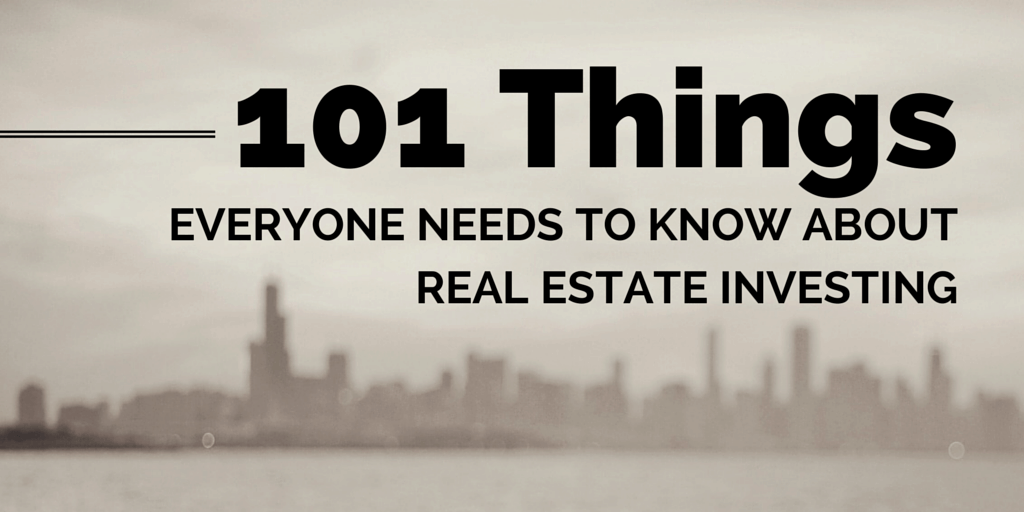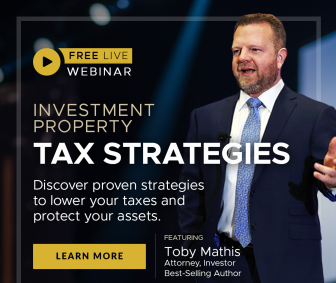
As with many other aspects of life – the real estate business can be a jungle to maneuver. For many of us, it's exceedingly easy to lose focus, make bad decisions, and get sidetracked along the way (often without even knowing it).
This past week, I've been asking some of my friends in the industry for their input on this issue. My goal was to compile a list of the most important recommendations these experts had to offer from their years of experience in the real estate business. I got a healthy collection of insights that I think you'll find quite enlightening.
Specifically, my question was this:
If you could only give 3 recommendations to a new real estate investor (based on your own experience in the business), what would be your Top 3 most important pieces of advice?
Not surprisingly – there were a few common themes that seemed to come up again and again throughout this list… can you spot what they are?
Let's dive in.
1. Collaborate. Find great team members to help you pull off your overall vision. One person alone can only handle so much (and it limits your education). – Ken McElroy
2. Know your numbers. It is easy to get emotional about a deal, no matter how experienced you are. If you know your numbers and stick to them, it takes the emotion out of the equation. This can save your wallet, big-time. – Joshua Dorkin
3. Be fanatical about due diligence. Try to obtain and confirm every bit of information you can about an investment — not just the physical property but the history and potential future of revenue, operating expenses, and capital costs. – Frank Gallinelli
4. Be a Closer Not a Poser. It only takes a moment to tarnish your reputation. You can't fake it till you make it. If you can't close, don't make an offer. – Mark Brian
5. Model your business after those who have already done it. There's no need to recreate the wheel – just follow the blueprint that others have created. – Joe Fairless
RELATED: The Anatomy of a Land Deal (A Case Study)
6. Always put it in writing – leases, addendums, amendments, notices, and the most basic of promises, should all be put in writing. Leases are best served as a written contractual document that both parties sign, but email saves time for things like general communication and notices to enter. – Lucas Hall
7. Don't try to learn everything. Gain as much general knowledge as you need to discover what makes you most excited, then focus on that one thing. For example, if you like the idea of small multifamily properties, focus on that and don't get distracted by flipping, wholesaling, and other cool strategies. – Brandon Turner
8. Understand how location relates to home values. I have seen numerous buyers purchase properties without understanding the value of various locations. They think they are paying a good price based on square footage, bedroom and bath count, etc. without having a grip on how an area can have a dramatic effect on value. – Bill Gassett
9. Have a clear vision of why you want to be a successful real estate investor, and what your investing business needs to do for you. – Steve Cook
10. Take action. We all have fear when doing things that push us out of our comfort zone. The only way around fear is to take action and find out there wasn't much to be afraid of. It will be uncomfortable at first, but like anything else, you will get used to it and will most likely get excited about it. I know it did. You couldn't shut me up when it came to seeing houses and making offers. – Danny Johnson
11. Avoid penny-pinching and the scarcity mentality. But definitely set a realistic budget and add to it every chance you get. Outsource as much as possible to maximize your time. Always shoot for a high return on your investment, but please don't ever expect something for nothing (…ain't gonna happen). – Jerry Puckett
12. When you pull comps, think in terms of an “apples to apples” approach. If the subject property was not available, would a buyer realistically consider purchasing the comps instead? Moreover, be careful to not choose a random price per sq ft figure and use that to establish your value since the figure might not fit your property. – Ryan Lundquist
13. Choose one investing strategy and master it before moving on to another one. It's really easy to get distracted by “shiny object syndrome” and lose your focus. Don't be tempted to “dabble” in a whole bunch of different strategies when you are just getting started. – Sharon Vornholdt
14. Don’t get emotional. Don’t pass up good deals just because you can’t picture living in them and don’t buy something that you adore if the math doesn’t work. – Debbie Drummond
15. Set actionable goals and activities. How many offers will I make each day, week, month? That will equate to how many deals I will close each month. Track your workflow. Whatever gets measured gets managed. – Mark Podolsky
16. Do NOT start out investing with a plan you constructed on your own. This includes deciding what/when/why/how to buy your first investment property(s). It's not that you don't know the answers. It's that you don't know all the questions. – Jeff Brown
17. When it comes to saving on taxes and setting up your entities, make sure you get the facts instead of falling victim to some of the common myths that are out there on the internet. – Amanda Han
18. Sit down with someone who invests in real estate (hopefully your own realtor) and ask them questions like, “How many homes have you purchased?” and “What is your primary goal – Buy and Hold or Buy and flip?” Ask them how many times they've failed as well. – Connor T. MacIVOR
19. Read a book a month then reach out to the author. My 2nd mentor came from reaching out to the author after I read his book. – Joe Fairless
20. Focus on creating cash flow. This is the golden source of income that will drive the value of every other aspect of your real estate business. – Seth Williams
21. In order to be successful in any kind of real estate investment in an emerging market, you need to do some careful analysis, you need a lot of drive and the vision to see what few others can see clearly at that stage. – David Lindahl
22. Don’t worry about the money. Focus on finding the best deal before the money to fund it. Investors invest in deals, not talk and marketing. – Ken McElroy
23. Don't take shortcuts in your repairs and updates. Shortcuts will end up costing you money in the long run when a prospective Buyer’s offer comes in lower than anticipated or when their inspections reveal poor workmanship in the property you're selling. Don’t let your properties be known as the gal/guy who delivers shoddy properties. – Lynn Pineda
24. Get Your Real Estate License – As a real estate investor, I couldn’t imagine trying to work the local distressed property market without a real estate license and is limited by another real estate agents skills if you need them. Realtors typically aren’t very knowledgeable of the speed and tactics used to acquire great properties for investors. Having your real estate license is an incredibly valuable asset, in my opinion. – Andrew Fortune
25. Treat your real estate just as an actual business. This means creating a plan of action, implementing those actions and growing your portfolio over-time. Don't forget – always track your business expenses…these can give you big savings at tax time. – Amanda Han
26. Avoid properties that have functional obsolescence. Don't think you are getting a fantastic deal because you think bought a property under value when in fact you didn't because the property has some kind of major functional defect. As an example having to walk through a dining room to get to a bedroom. Who wants to do that? – Bill Gassett
27. Associate with people you want to become more like. If you want to become a successful landlord – find other successful landlords to hang around with, either online or in the real world. – Brandon Turner
28. Hope for the best but plan for the Worst. Always have several exit strategies and contingency plans no matter what your investing strategy plan or goal is. Doesn't matter if you are flipping or buy and hold, you must be prepared for SNAFU! – Mark Brian
29. Make sure you're relevant. Research what's happening in the market you'll be investing in before you spend time, money, and resources. What's working even a year ago may no longer be where you need to focus, so make sure what you're offering and who/what you're targeting are still lucrative. You always have to be thinking “what's my value add here?” and build around that. – Tracy Royce
30. Establish a successful mindset, this is what I refer to as the “rule of the universe” – what you expect tends to become the reality you create. Keep your head down, work hard and expect to win. If you do this long enough, one day (sooner than you think) you will look up and the reality around you will have changed for the better. – Chris Feltus
31. Expect the unexpected from tenants. Plan for the worse and be pleasantly surprised when you get a great tenant. Tenant planning usually involves money; either periods of no tenants, making property repairs to non-functioning items and non-paying tenants. It’s critical to have reserve funds available to handle these money draining time periods. – Lynn Pineda
RELATED: The Quick and Easy Guide to Tenant and Borrower Screening
32. Don't be afraid to ask for help. There are so many details in real estate that it can be overwhelming. One of the great things about experienced investors is that they have all been in your place. Turn to more experienced investors with your questions, as there is no such thing as a stupid question. – Joshua Dorkin
33. Focus on raising rental income without annoying your good tenants. The best way to do that is by being attentive to and flexible on reasonable tenant requests. It is much easier to increase rents on happy tenants than those that you've been fighting against. – Elias Nathaniel
34. Spend time learning the math. The math will keep you from buying a bad deal, which is more important than buying a good one! – Brandon Turner
RELATED: The Beginner's Guide to Buying Rental Properties (A Case Study)
35. Get the money, then hand over the keys. Always collect the security deposit and any pre-paid rent before you allow a tenant to move into a property. Don't just accept a personal check but rather make sure that the money is in your bank account before handing over the keys. – Lucas Hall
36. Understand the difference between passive income and active income. Active income means you work for your money (and secretly, most real estate investments actually require a lot of work). Be able to differentiate between working for your money and being able to earn is passively (there's a huge difference!) – Ali Boone
37. It's important to network with like-minded folks to bounce ideas off of, advise you on your first few deals and help through the rough patches. Things will not always be easy or run smoothly, especially at first. – Sharon Vornholdt
38. Relationships. In the world today everything is very fast-paced/cut and dry. Everyone is just trying to get the job done and make money. This method may get things done quickly, but it doesn’t necessarily ensure quality. By taking your time and focusing on building relationships you can eliminate the ones looking for a quick penny and only work with people who genuinely have your best interest at heart. – Engelo Rumora
39. Know who all the players are in your market…… who they are and what they do. You want to be known as “the guy (gal)”. Being able to put people together with what they want will enable you to monetize more of the leads you pay for, which will let you market more which will get you more leads, which you will monetize….. – Jerry Puckett
40. Buy properties in great neighborhoods with good school systems and great highway access. When you follow a blueprint of what the market wants you will be in a much better position to make a profit. Go with what the majority of buyers are looking for and you will be in a much more favorable position. – Bill Gassett
41. Create a plan. You don't have to have a detailed business plan with every little detail included to be successful, but you do need a plan. Knowing what strategies you're going to take, what criteria you're looking for, what your exit strategies are, what your financing possibilities are, and other key details will help you to be more successful. Putting pen to paper and mapping out your first deal(s) will also help mitigate the paralysis by analysis that most new investors experience. – Joshua Dorkin
42. Learn Your Markets Numbers: Know how much properties are actually worth and how much you can pay. The ones that are the best at picking up off-market deals are those that know exactly how much they can pay. That knowledge produces confidence; confidence + accurate numbers = a strong offer; strong offers + repetition = deal flow and more confidence. – Jerry Puckett
43. Know Your Limitations – As much as I hate to admit it, my design skills SUCK. I can barely match my clothes right. I have no business picking out decorative items, so I have other people help me with that. My favorite place to find design products is in new build properties because they are very skilled at knowing what sells right now. My wife is also very skilled at this and has helped me many times with design choices and staging ideas. Embrace your limitations! – Andrew Fortune
44. Become a Master of influence. – Claude Diamond
45. Don't overbuild for the neighborhood. Look at what other investors and homeowners have done, and don't do anything more than that because these upgrades likely reflect what buyers expect in the neighborhood. – Ryan Lundquist
46. You don't have to leap off a cliff – take baby steps. You don't need to know from A-Z, every conceivable way to deal with a real estate situation. Start with what comes first: get a look at the big picture and start marketing for leads. You don't have to have money lined up to be able to buy the house. If you can find a super deal, you can find a buyer and assign the contract to them for a hefty assignment fee. You don't need headlights on your car that illuminate the entire route from San Antonio, Texas to Chicago, Illinois to get there at night. You need to only focus on what is immediately ahead. – Danny Johnson
47. Follow the plan and give it your all. Persevere through the tough times, and celebrate the highs. – Steve Cook
48. Create a good relationship and a good reputation with the brokerage community. Negotiating commissions during or after a deal are done or delaying the payment of commission will only serve to create distrust towards you. Word of this kind of behavior gets around quickly and will cost dearly over time. – Elias Nathaniel
49. Trust is established over time, not over one email, phone call or meeting. Finding and working with individuals that are happy to spend “that” time in building your trust is a key factor to maintaining and growing a solid business relationship. Unless such trust is established, it will be very difficult to preserve the relationship and successfully obtain your desired goals/benefits. – Engelo Rumora
50. Nothing verbal is valid. Even if it's your favorite uncle or brother-in-law with which you're going to have as your investment partner – everything needs to be in writing and within a secure “legally bound” contract. This is business – and it has to be handled that way!!! – Connor T. MacIVOR
51. The only time I lost money in real estate was when I wasn't in control of the deal. So the more control you can keep, keep it. – Dave Van Horn
52. Set goals that are specific and measurable for achieving success in investing. Example: I want to buy my first rental in July 2015. Work that goal backward to specific tasks you must do every week to achieve that goal. – Mark Ferguson
53. Love and care about people. Try to add value to people's lives daily. – John Fedro
54. Get started right away. The best way to learn is by doing. – Conor Flaherty
55. Don't give up. People aren't successful because they want it, they are successful because they want to succeed so bad they will fail, and learn, and fail, and learn, and get better, and change, and become great, become successful because they were willing to do more than everyone else was. – Nathan Brooks
56. When flipping a house, be cautious about estimating the after repair value. The value should be based on similar sales and listings in the immediate neighborhood – as opposed to cherry-picking higher sales from superior areas. – Ryan Lundquist
57. One thing to keep in mind when doing a bathroom or kitchen remodel is the amount of money that is being spent. It’s important to not go overboard and spend tens of thousands of dollars on remodeling a bathroom. Simple things such as switching light fixtures, vanities, and tub enclosures are all great ways to boost value while not breaking the bank! It’s not recommended to spend more than 5% of the home's value on a remodel. – Kyle Hiscock
58. Once you have decided on an investing strategy and you have a budget for marketing, create a marketing plan. What will that look like? Will you be doing direct mail, bandit signs, using one of the many (free) Craig's List strategies or something else? Remember that your investment strategy will be greatly impacted by the amount of money you have to spend on marketing. – Sharon Vornholdt
59. The first thing to tackle is your own motivation. If you are not ready to leave the rat race behind and embrace a future where your hard work allows you to enjoy anything you really want, then maybe you are not ready to take advantage of any kind of real estate investing. – David Lindahl
60. Put together your business plan. Decide whether you’ll be looking at holding the properties for a few years or flipping them. Do the math on each property to make sure it fits your margins. – Debbie Drummond
61. Create systems in the beginning so you can quickly scale and work on the business and not so much in the business. Hire people smarter than you to help in the areas of your business you are weak to help avoid mistakes. Always be learning and educating yourself. – Mark Podolsky
62. Your network is everything. Things go wrong in every real estate deal – a good network will help you succeed in spite of the inevitable obstacles. – Conor Flaherty
63. Focus on creating friendships – not contacts. Instead of “networking” at an event just meet people and try to make friends based on common interests. The biz will be a natural output from the friendship. Plus, it's for more fun this way. – Joe Fairless
64. “Communication, communication, communication… instead of location, location, location… I can’t stress it enough!” This is one of the most important components when looking to successfully invest in Real Estate. In the end, you want to work with people who will, through good communication and integrity, build your trust and develop a prosperous and long-term relationship with you. – Engelo Rumora
65. Automation is all about systems and keeping things simple. The most successful investors I know have systems for everything. A good SYSTEM: Saves Your Self Time, Energy, and Money. And a good system should be simple, it should not be complicated. And why do you have systems? So you can delegate them, of course! – Joe McCall
66. Be honest and ethical when withholding the deposit. Many landlords try to withhold the deposit for normal wear and tear, or overcharge for small repairs. Wrongful or undocumented charges will often force a landlord to forfeit the claim on the deposit. Worse, the landlord can be held liable for up to 3x the amount of the deposit, according to the laws in many states. – Lucas Hall
67. Combining strategies, if done expertly, can turbocharge both capital growth and retirement income. It can also hasten retirement. – Jeff Brown
68. You don't need your own money to invest, you can use other people's money. Being disciplined is more important. – Dave Van Horn
69. Remember that You Make Your Money When You Buy Real Estate, Not When You Sell Real Estate. Don't bank on repairs to enable your profit. If you are already in the green when you walk out of closing, you are already off to a great start. – Mark Brian
RELATED: How Much Should You Offer For That Property?
70. Make a decision and stick with it. Real Estate Investing is not the “get rich quick yell at contractors and make $50,000 on every house” that's it been popularized as. It's like another profession that takes time, knowledge, and effort to become successful at. And just like any other profession, it's not always easy. What will keep you going is your determination, and hopefully…your profits? – Tracy Royce
71. Just like a bathroom remodel, a kitchen remodel is a great way to boost the value of a home, however, it’s suggested not to spend more than 10% of the home's value on the remodel. Kitchens and baths are usually the main selling point in a home. One important thing to consider when doing a kitchen remodel is the amount of time that the homeowner is planning on staying in the home. If only a couple of years, installing granite counters and high-end cabinets may not be the best idea. – Kyle Hiscock
72. Get a mentor. You can read all the books you want but that does not equal what it means to be within a real estate deal, looking at the project, and walking through with someone who is skilled in assessing, solving, and selling… the property you invested in. – Nathan Brooks
73. Talk to as many investors as you can in your area and online. Learn from local investors what they are doing and how. Take them to lunch or coffee and learn by example. – Mark Ferguson
74. Extend your due diligence to the market as well. Properties don’t live in a vacuum. What are the economic dynamics of this market — occupancy/vacancy, prevailing lease rates, cap rates, financing? What are the business and employment climates and where do they seem headed? – Frank Gallinelli
75. Realize that real estate investing doesn’t have to be that hard. You don't have to do all the complicated parts of it yourself. This was why I didn't get into real estate investing sooner – I didn't know how to do all those things (like finding motivated sellers, buying foreclosures, rehabbing houses, landlording…. Yuck)! But there are other ways to do it, so don’t feel like you have to do it the hard way. – Ali Boone
76. Learn from others who have made countless mistakes before you. Duplicate what is already working. – John Fedro
77. You are not in the “Real Estate” business. You are in the “Marketing” business. You must have a “Marketing Plan” and you must implement that plan to succeed in business. You need to know how many sellers you should talk to, and how many offers you should make, every day. – Joe McCall
78. Find a Realtor who knows the market where you plan to invest in. They can help you find the right opportunities to meet your budget and goals. Successful investors tend to be repeat clients so the Realtor will have a vested interest in your success. – Debbie Drummond
79. Find a local mentor. It's easy for someone to take you seriously when you're already showing that you are going to be a force to reckon with. If you have leads coming in, people are going to listen to you…and help you. When something comes up that you don't know how to handle, you will have someone a phone call away that can help you. – Danny Johnson

contract
80. Ensure that your lease complies with your state's laws. If you try to use a “free lease template” or fail to integrate your state's requirements into your lease, you might find yourself defenseless in court. Don't give your tenant a reason to sue you; follow the law. – Lucas Hall
81. Get as close as possible to your CORE (cost of repairs estimate) when evaluating a property's condition before you make an offer. Do it 10 times if you have to and add 10% to that number as an additional safety measure. Take your trusted, qualified contractor with you to confirm the numbers. The last thing you want to do is go tens of thousands over your original projections (as many do). You won't be in this business long if you do. – Mike LaCava
82. No matter how brilliant our overall long-term plan may be, life happens. The #1 factor in anyone's real estate investment plan must be flexibility. Sometimes it'll be the reason you survive, while sometimes it'll prove to be the reason you raced past everyone else. – Jeff Brown
83. Have a specific plan of action for one type of investing. Decide exactly what you want to do as an investor; flip, hold, wholesale, etc. Focus on that type of investing and learn all you can about it. Don't try to learn and do everything at once. Once you master one thing, you can move on to another if you want. – Mark Ferguson
84. Investing in real estate is not emotional, it's business! If the deal doesn't make financial good sense, walk away. – Deborah Lamb
85. Recognize what you're good at and do only that. Hire or partner with the best people possible to fill in your weaknesses (we all have them). – Ken McElroy
86. Recognize the importance of clarity. First, be clear about your own investment goals. Are you looking for immediate cash flow, long-term growth, low risk/low upside, high risk/high upside? Then be clear when you communicate with sellers and lenders. Master your investment vocabulary; present your financial data in a way that everyone can understand. – Frank Gallinelli
87. Leave your emotions at the door. Your rental property is a business, with real money and equity involved – so treat it that way. Every applicant must be treated fairly without bias or prejudice. The most successful landlords are courteous, professional, and stay in control. – Lucas Hall
88. Decide what profit margin you want to adhere to. Break it down to a dollar amount or percentage. For example, “For each property I'm going to flip, I need to walk away with at least $25,000 in net profit after all is said and done.” This will make it easier to identify the listings that fit your criteria. Never violate your own line in the sand!! – Connor T. MacIVOR
89. Be prepared for the worst. Rising mortgage rates, economic downturns, vacancies, etc. should be planned for in advance. You don't want to find yourself in a corner with little or no maneuvering room. The amount of control you have over your real estate has a huge impact on the ultimate success of your investments. – Elias Nathaniel
90. Find out what you're good at and do it. Get someone to do everything else for you. Now that you have the marketing plan automated and systematized, get it off your plate! If you're anything like me, if you don't get somebody else to do your marketing, it just won't get done. So it all circles back to marketing. The chief goal is to get all of your marketing done for you, in spite of you. Never stop marketing. It will solve all your money problems. The best marketer will always win. – Joe McCall
91. Be open-minded, flexible and creative. Be ready to pivot quickly and when you find a successful buying and selling channel keep working it until it doesn’t work any longer and then quickly pivot to market changes. Keep finding ways to help your buyers and investors meet their goals. Always be marketing and communicating with your customers. Build long-term relationships and your own platform. – Mark Podolsky
92. Buying an investment is significantly different from buying your home or your vacation home. Don't fall in love with the property and don't ask yourself if you would like to live in it. When it comes to investment properties, look at the numbers to see if it makes sense as an “investment” and not as if it is your next dream home. – Amanda Han
93. Act fast when something isn’t working. Don’t wait. Chances are, if it starts not working, it will continue not working. Bad situations can spiral fast in real estate investing, so don’t hesitate to nip something in the bud quickly! Emotions have to be put aside, you may not be able to stay Mr. (or Ms.) Nice Guy during it, just get it done. – Ali Boone
94. If You Can Do It Yourself, Then Do It! – I’ve read too many articles giving advice to investors that they should be hands off and hire professionals for everything that needs to be done. I’m sorry, but I enjoying rehabbing properties myself and my ROI is exponentially higher when I am at the property doing as much of the work as I can because I’m good at it and I enjoy it. If you have the skills, don’t be afraid to use them just because other investors do not. – Andrew Fortune
95. Network. Regardless of whether you're shy, new, have no money, bad credit, it doesn't matter. What will help to drastically reduce your learning curve and possibly increase your profits is who you know and what you can bring to the table for each other. Be open-minded to strategic partnerships, mentorships and building your team. In this business, it's everything. – Tracy Royce
96. Learn from your mistakes and don't let the same mistake happen twice. When you do make a mistake, get up, and move forward without hesitation. – John Fedro
97. Saving is important. Whether to buy new deals or help fund existing ones, you are going to need money. Make sure to save as much as you can. – Conor Flaherty
98. Learn the Art and Science of Persuasion. – Claude Diamond
RELATED: Getting People To Say Yes
99. The only debt you should have in your business is on assets that are paying for themselves. Don't take out loans for liabilities that won't carry their own weight! This is completely unsustainable, and one of the fastest ways to run your business into the ground. – Seth Williams
100. Understand how long it will take you to buy, renovate and sell a property. Know what your costs are going to be for at least one year and if you are paying on a loan, you must know what your monthly payments will be along with taxes, insurance, maintenance (so you can be prepared to pay for all those carrying costs if you don't sell right away). Always make sure you have a few exit strategies if things don't go the way you anticipate. – Mike LaCava
101. Create a written game plan. Include things like capital on hand, lender approvals, partner splits and resources to hunt/write/repair and flip or rent. – Connor T. MacIVOR













